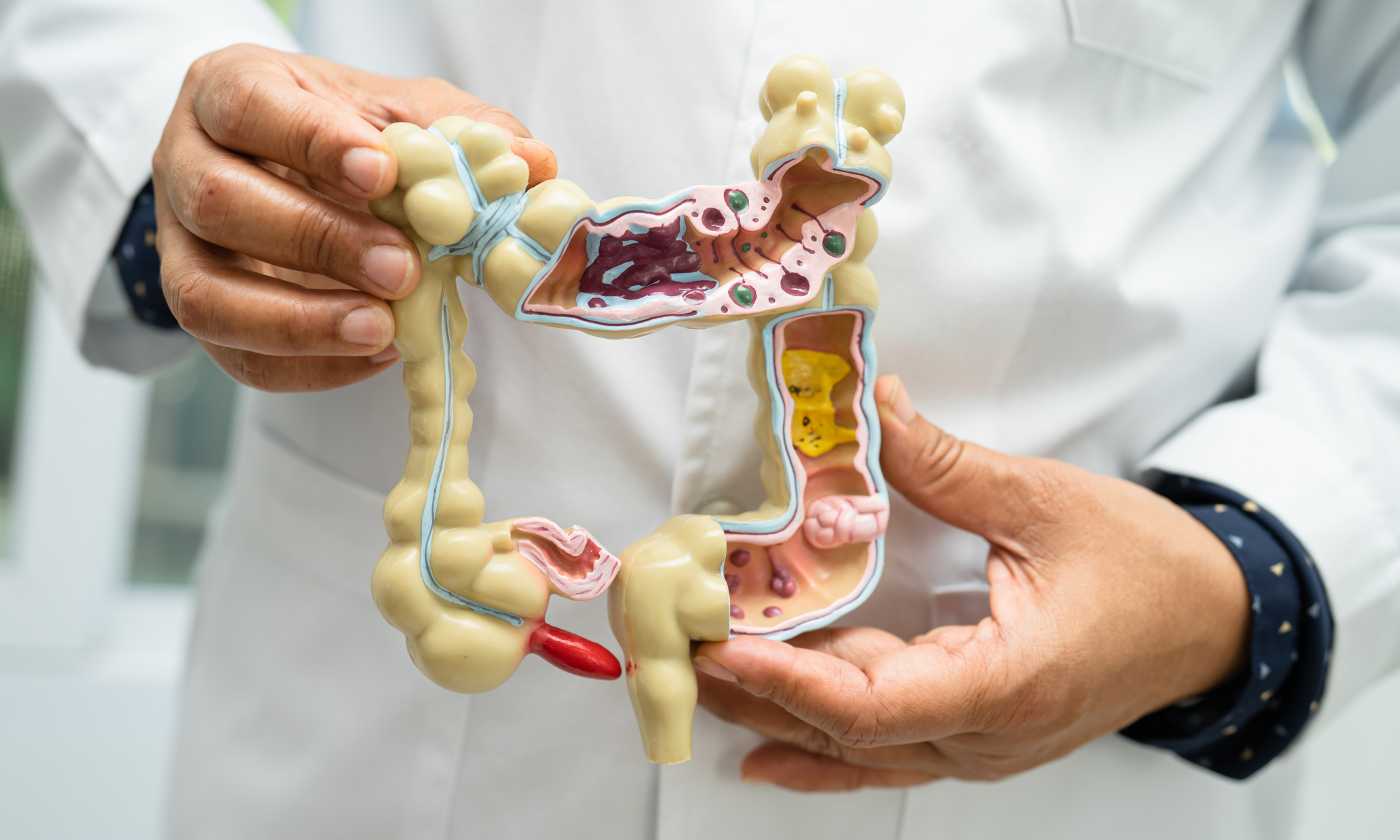What is Digestive Health?

KEY TAKEAWAYS
- Digestive health impacts nutrient absorption, immunity, and mental well-being, making it essential for overall health.
- Eating gut-friendly foods, staying hydrated, and managing stress can significantly improve digestive function.
- The gut microbiome plays a central role in digestion, influencing energy levels and inflammation.
- Regular meal schedules and limiting processed foods are key habits for maintaining better digestive health.
- Probiotics and prebiotics work together to restore and maintain gut balance, supporting optimal digestive health.

Digestive health refers to the state of balance and efficiency within your digestive system, ensuring that every step in the process—from breaking down food to absorbing nutrients and eliminating waste—functions optimally. It’s more than just avoiding discomfort like indigestion or bloating; it’s about maintaining a system capable of sustaining energy, supporting immunity, and promoting mental and physical health.
When your digestive health is compromised, issues such as nutrient deficiencies, inflammation, and fatigue can arise, highlighting its role in overall well-being. A healthy digestive system enables your body to extract the maximum benefit from the foods you eat while eliminating harmful toxins and waste products effectively. This balance is critical for fostering vitality and reducing the risk of chronic health concerns.
Understanding digestive health gives you the tools to nurture your body’s intricate systems, enhancing everything from your energy levels to your immunity. A proactive approach to maintaining digestive health can transform how you feel every day, making it an essential part of a sustainable wellness routine.
Understanding the Digestive System

The digestive system is a vital network of organs that transforms the food you eat into essential nutrients, sustains energy, and eliminates waste. It works tirelessly to ensure your body absorbs what it needs while disposing of toxins that could harm your health. Each organ—from the stomach and small intestine to the liver and colon—plays a unique and irreplaceable role in this process. When the digestive system is functioning properly, you feel energized, balanced, and free from common issues like bloating or sluggishness.
Understanding how your digestive system works is key to maintaining your overall well-being. It’s not just about avoiding discomfort; it’s about improving your immune system, mental clarity, and even emotional health. Prioritizing digestive health supports optimal body functions and sets the foundation for a vibrant, healthier life.
"Without proper digestion, your body cannot absorb nutrients, eliminate waste, or sustain energy levels effectively."
Key Components of the Digestive System
- Mouth and Saliva: Digestion begins in the mouth, where chewing and saliva enzymes initiate the breakdown of carbohydrates.
- Stomach: The stomach mixes food with gastric acids, breaking it into a semi-liquid form for further digestion.
- Small Intestine: Nutrient absorption takes place here, where food particles are processed into usable components like amino acids, vitamins, and minerals.
- Large Intestine: This organ extracts water and prepares waste for elimination while supporting beneficial gut bacteria.
- Liver and Pancreas: These accessory organs produce enzymes and bile to facilitate fat digestion and regulate metabolic processes.
Each organ contributes to the delicate balance of the digestive system, making it essential to protect and optimize its function. When the digestive system operates effectively, you can better absorb nutrients, eliminate toxins, and support the natural processes that keep you feeling your best. Investing in your digestive health provides benefits that extend to your physical, mental, and emotional well-being.
How the Digestive System Supports Overall Health
- Energy Production: The digestive system converts food into glucose, the body’s primary energy source.
- Detoxification: The liver, a key digestive organ, filters toxins from the blood, preventing harmful substances from accumulating.
- Microbiome Health: Beneficial gut bacteria in the digestive tract help regulate inflammation, mood, and immune function.
A well-balanced digestive system is the cornerstone of overall health, ensuring that every process in the body operates seamlessly. From converting food into energy to supporting the immune system’s defense against illness, the digestive system influences nearly every aspect of well-being. When your digestive health is optimized, your body efficiently absorbs essential nutrients, eliminates waste, and maintains hormonal balance, all of which are critical for vitality and resilience.
Prioritizing digestive health goes beyond managing discomfort like bloating or irregularity; it’s about creating a strong foundation for your long-term well-being. By taking care of your digestive system, you improve your energy levels, support cognitive function, and reduce the risk of chronic diseases, making it a key pillar of a healthy lifestyle.
Importance of Digestive Health

Digestive health is central to maintaining your overall well-being, influencing everything from how your body processes food to how it combats illness. The digestive system doesn’t just break down what you eat; it powers the absorption of nutrients that fuel your cells and energize your body. Without a healthy digestive system, your body struggles to function efficiently, leading to issues like low energy, compromised immunity, and chronic inflammation.
One of the most critical aspects of digestive health is its role in the immune system. Since the gut hosts around 70% of your immune cells, maintaining a balanced digestive system is essential for defending against pathogens and reducing the risk of infections or autoimmune conditions. Beyond physical health, the digestive system also impacts mental well-being. The gut-brain connection, mediated through the gut microbiome, plays a key role in regulating mood, stress responses, and even cognitive performance.
Digestive health extends far beyond comfort or avoiding occasional stomach upset. It’s a vital pillar for long-term health, affecting everything from your physical stamina to your emotional balance. By prioritizing your digestive system, you support the processes that help your body and mind thrive, ensuring better quality of life and disease prevention.
How to Restore Digestive Health

Restoring digestive health involves a combination of dietary adjustments, lifestyle changes, and mindful habits that support the body’s natural processes. When your digestive system isn’t functioning at its best, these steps can help bring it back into balance and ensure long-term health.
- Increase Fiber Intake: Eating fiber-rich foods like fruits, vegetables, and whole grains promotes regular bowel movements and nurtures healthy gut bacteria.
- Stay Hydrated: Drinking enough water supports digestion by helping food move smoothly through the digestive tract and preventing constipation.
- Incorporate Probiotics and Prebiotics: Probiotics (found in foods like yogurt and fermented vegetables) introduce beneficial bacteria, while prebiotics (found in garlic, bananas, and onions) feed those bacteria.
- Reduce Processed Foods: Limiting high-fat and processed foods minimizes digestive strain and prevents inflammation in the gut lining.
- Chew Your Food Thoroughly: Proper chewing breaks food into smaller pieces, making digestion easier and improving nutrient absorption.
- Manage Stress Levels: Chronic stress negatively impacts digestion; techniques like meditation, yoga, or breathing exercises can help reduce this effect.
Restoring digestive health doesn’t happen overnight, but consistent effort in these areas can make a significant difference. Small changes, like adding more fiber or reducing processed foods, compound over time to create a healthier gut environment. With a targeted approach, you can address digestive concerns and enjoy the benefits of improved energy, better nutrient absorption, and overall vitality.
"Approximately 70% of your immune system resides in the gut, making digestion a cornerstone of your body’s defense mechanisms."
Maintaining Better Digestive Health

Maintaining better digestive health requires consistent attention to your daily habits. The choices you make each day can significantly impact how well your digestive system functions, influencing everything from nutrient absorption to immunity. Building sustainable routines ensures your digestive system continues to operate efficiently, promoting long-term health and vitality.
Eat a Balanced Diet
A well-rounded diet rich in fruits, vegetables, whole grains, lean proteins, and healthy fats provides the essential nutrients your digestive system needs. Fiber, found in plant-based foods, is particularly crucial for maintaining regular bowel movements and fostering a diverse gut microbiome. Balanced eating not only prevents digestive discomfort but also strengthens the gut's ability to process and absorb nutrients.
Practice Portion Control
Overeating can overwhelm the digestive system, leading to discomfort and inefficiency. Consuming moderate portion sizes allows your stomach and intestines to process food more effectively, preventing issues like bloating or acid reflux. Smaller, well-spaced meals also help maintain steady energy levels throughout the day.
Stay Physically Active
Physical activity plays a pivotal role in maintaining healthy digestion. Exercise stimulates intestinal muscles, supporting the movement of food through your digestive tract. Activities like walking, yoga, and strength training can reduce the likelihood of constipation and enhance overall digestive efficiency.
Prioritize Restful Sleep
Quality sleep is essential for allowing your body, including your digestive system, to repair and recharge. Poor sleep can disrupt hormone regulation and gut function, leading to imbalances in digestion. Establishing a consistent sleep routine supports optimal gut health and enhances your body’s natural rhythms.
Limit Harmful Substances
Excessive consumption of alcohol, caffeine, and processed foods can irritate the digestive system and disrupt the gut lining. Smoking further damages gut health, increasing the risk of digestive disorders. Reducing or eliminating these substances promotes a healthier digestive tract and prevents inflammation.
Developing these habits creates a foundation for improved digestive health, helping you feel energized and balanced. By integrating these strategies into your routine, you not only protect your gut but also enhance your overall wellness, ensuring your body operates at its best.
How to Improve Digestive Health
Improving digestive health requires intentional actions that enhance the way your digestive system functions. Even small, consistent changes can yield significant benefits, supporting energy levels, immunity, and overall well-being. Implementing targeted strategies can help reduce common digestive issues while promoting long-term gut health.
- Add More Fermented Foods: Foods like kefir, sauerkraut, and kimchi contain probiotics that support gut bacteria and improve digestion.
- Limit Artificial Sweeteners: Many artificial sweeteners disrupt gut microbiota, so reducing their intake can support a balanced digestive system.
- Eat on a Regular Schedule: Sticking to consistent meal times helps regulate your digestive processes and reduces stress on your gut.
- Avoid Late-Night Eating: Eating too close to bedtime can interfere with digestion and disrupt the gut’s natural rhythms.
- Incorporate Digestive Enzymes: If your digestion feels sluggish, enzyme supplements can help break down food more efficiently.
- Consume Healthy Fats: Including omega-3-rich foods like fatty fish, nuts, and seeds can reduce inflammation and support gut lining integrity.
Improving your digestive health doesn’t require drastic measures—just thoughtful, daily practices that strengthen the foundation of your gut’s functionality. These actionable steps can help eliminate discomfort and promote optimal nutrient absorption, leaving you with more energy and a balanced system that supports long-term wellness. Taking control of your digestive health can have a profound impact on your physical and emotional vitality.
Digestive health is a critical foundation for overall well-being, influencing everything from nutrient absorption to immunity and mental clarity. A well-functioning digestive system ensures your body gets the energy and nutrients it needs while efficiently eliminating waste. By understanding its importance and making intentional choices, you can prevent common issues like bloating, discomfort, or fatigue, and support long-term health.
Restoring and maintaining digestive health is achievable with consistent habits like eating a balanced diet, staying hydrated, managing stress, and incorporating gut-friendly foods into your routine. These actions not only improve digestive function but also enhance your quality of life by fostering resilience, energy, and balance.
Taking care of your digestive system is an investment in your overall health. Small, sustainable changes can lead to significant improvements, ensuring you feel your best every day. Start prioritizing your digestive health today to unlock the benefits of a stronger, healthier body and mind.
For those seeking a more personalized approach to digestive health and overall wellness, Roots Nutrition offers expert-curated supplement packages tailored to your unique needs. Founded by Dr. Romeo Brooks, a pioneer in holistic health, Roots Nutrition combines decades of expertise in natural healing with scientifically-backed solutions. Discover how our natural supplements can support optimal digestion, detoxification, and vitality—empowering you to achieve your health goals.
Common Questions About Digestive Health
What foods are best for improving digestive health?
Fiber-rich foods like fruits, vegetables, whole grains, and legumes are excellent for supporting digestive health. Fermented foods such as yogurt, kefir, and kimchi provide probiotics, which balance gut bacteria and improve digestion. Healthy fats, like those found in avocados and nuts, also support the gut lining and reduce inflammation, enhancing overall digestive health.
How does stress impact digestive health?
Stress affects digestion by disrupting the gut-brain axis, leading to slower food processing, inflammation, and potential imbalances in gut bacteria. Chronic stress can exacerbate conditions like irritable bowel syndrome (IBS) and indigestion. Techniques such as mindfulness, meditation, and yoga can alleviate stress and promote better digestive health care.
Can hydration improve digestive health?
Staying hydrated is essential for maintaining a healthy digestive system. Water aids in breaking down food, softening stool, and preventing constipation. Proper hydration also supports nutrient absorption and ensures smooth functioning of the digestive tract. Drinking water throughout the day, particularly with meals, is a simple way to improve digestion.
What are the signs of poor digestive health?
Common signs include bloating, constipation, diarrhea, heartburn, and fatigue. Other symptoms, like nutrient deficiencies, frequent illness, or skin issues, may indicate imbalances in the gut microbiome. Addressing these symptoms early through diet and lifestyle changes can prevent long-term health complications.
How do probiotics and prebiotics contribute to digestive health?
Probiotics introduce beneficial bacteria to the gut, improving microbiome balance, while prebiotics feed these bacteria, helping them thrive. Together, they enhance nutrient absorption, reduce inflammation, and support immune function. Including foods like yogurt, garlic, bananas, and onions in your diet is a natural way to incorporate both probiotics and prebiotics.





